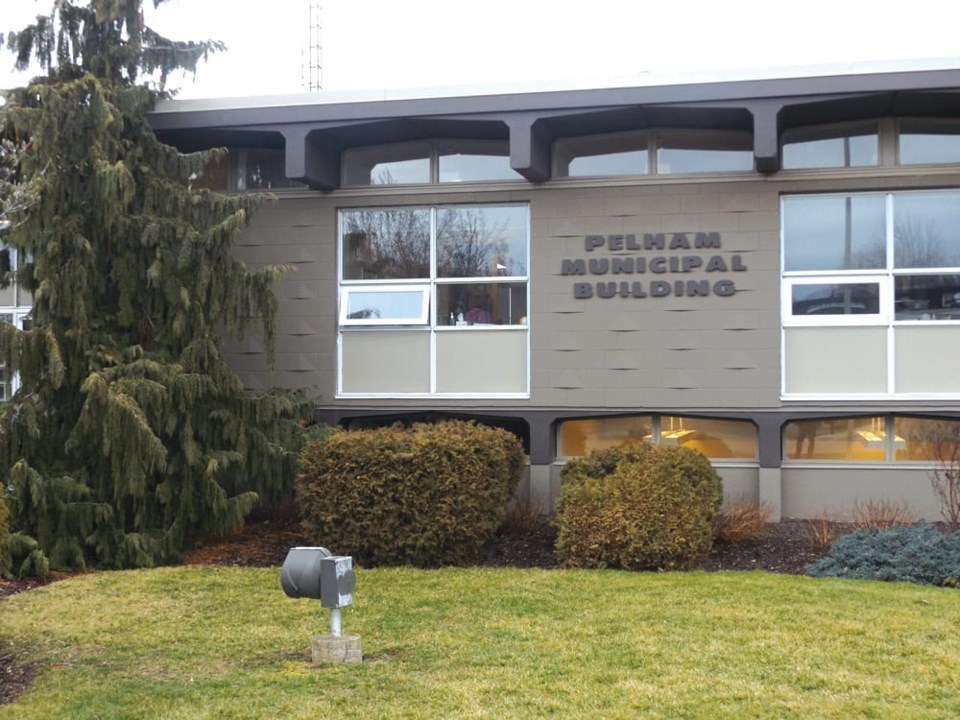BY VOICE STAFF
Apartment site plan approved
At the October 15 Town Council meeting, the Town entered into a site plan agreement for Baxter Hall, in Fenwick.
The approved plan will see the redevelopment of the historic property being converted into 76 one-bedroom, assisted living units for seniors, with designated space for medical and commercial uses at street level.
At a meeting last March, Town Council lifted the holding (H) Institutional –265 (H) zone provision of the Zoning By-law for lands located on the northeast corner of Baxter Lane and Welland Road, 1105 Baxter Lane and 769 Welland Road, so the site plan could be completed.
This was lifted to address archaeological, clearance, traffic study impacts, and sanitary sewer capacity concerns.
Councillor Richard Rybiak looked at the apartment block as an all-around economic benefit to the Fenwick community, from the increase of an additional 100 residents to the employment he asserted it will provide.
“I lived here long enough to remember that Fenwick was a bustling hub for the local community until we lost that due to the loss of the high school, Canada Post Office and other services” he said.
Councillor Gary Accursi said the development would attract and revitalize the commercial aspect of Fenwick’s downtown core.
“I am hopeful that with this project and the old fire hall project there will be an attraction for new businesses that will improve the vibrancy and draw people to Fenwick to see what a wonderful little place it is,” Accursi said.
“It will add strength to the existing businesses that are in the downtown core.”
Mayor Dave Augustyn said this project allows older and existing Fenwick residents to “age in place.”
“This provides an option for them to stay active and involved in the community that they love.”
The proposal was first presented to council in July 2016.
Councillor Peter Papp didn’t vote on the motion due to a conflict of interest.
Fenwick resident Dan Marr expressed concerns with future development of the site. As an Emergency Services (EMS) worker in a larger city, Marr says that it’s a “fantastic proposal” for a city, but not for a village the size of Fenwick.
 The 30-year resident said this development would have an impact on the area’s infrastructure in all aspects, including hydro, water, natural drains and especially roadways due to the increased traffic flow by both residents and EMS traffic.
The 30-year resident said this development would have an impact on the area’s infrastructure in all aspects, including hydro, water, natural drains and especially roadways due to the increased traffic flow by both residents and EMS traffic.
Marr said that he is in favour of change and redeveloping the area, “I’m just opposed to the size of change being proposed.”
Barry Robins, a 40-year Fenwick resident, is concerned with the size of the development. His reasoning for the concerns is that in some areas of Fenwick, the ground is like quicksand, which can cause issues with drainage, and leads him to question how underground parking could be supported.
“[The underground parking is] going to be their swimming pool,” when it comes to any rain and water drainage issue.
Robins said that the storm and sanitation sewers are too small to handle the influx of unit usage. Road concerns were also expressed, as Baxter Lane is only one-way and Welland Road is already in “terrible shape,” especially with the ongoing traffic of heavy-duty construction vehicles.
Robins was a firefighter before retiring and said that seeing the flashing lights of EMS traffic due to medical responses, accidental and real alarm activations, and other unknown 911 calls is not something he wants to experience on a regular basis.
With Rybiak’s observations that the unit may boost the core’s economy, Marr and Robins disagree. Marr said that because it’s an assisted living facility, for the most part, the residents will be eating meals and doing activities within.
Robins said in earlier times, Fenwick was booming with two grocery stores, two feed mills, an independent meat shop and two barbershops.
“That’s all gone now. And, I understand. People who starting working outside Fenwick began picking up or did what the needed on their way home from work.”
The site plan includes clauses stating that the complex developers are responsible for the installation, repair and maintenance of a private storm water system, must maintain all necessary connections and all internal water supply services, sanitary sewer connections, and no foregoing, no storm, surface or roof water or weeping tiles shall be discharged into the sanitary sewer system.
One-year pause for pot
Any plans for cannabis production facilities seeking out Pelham as their future base of operations within the upcoming year has been snuffed out.
Pelham Town Councillors unanimously approved an interim bylaw restricting any cannabis-related development to take place within town boundaries for both recreational and medical production.
This bylaw affects the Town’s land use policies and regulations pertaining to cannabis-related land use, restricting the use of all lands in the municipality for a one-year period.
The period will allow staff to review current Town land use planning policies and regulations pertaining to cannabis and develop appropriate policies and regulations for future industry growth.
Councillor Gary Accursi requested the bylaw be amended to include the term “agricultural” in two subsections.
The first subsection is regarding the use of any land, building or structure for any agricultural, commercial or industrial cannabis purpose. Exempt are existing facilities before the bylaw was implemented and as long as they continue to be used for such purpose.
 The second subsection concerns allowing construction, alterations or expansions of any building or structure for any commercial or industrial cannabis purpose.
The second subsection concerns allowing construction, alterations or expansions of any building or structure for any commercial or industrial cannabis purpose.
Before the bylaw was passed, two delegations came before council.
The first delegation was CannTrust, which owns an existing production facility in Fenwick. The company presented that it wanted to be exempt from the bylaw so it could proceed with future expansion of its facilities on Balfour Street.
The acquisition of the 1350 Balfour Street property occurred on October 10, however, the final agreement still has to be closed between the property owner and CannTrust.
For now, until the properties merge after final agreement, they are each their own entity.
This property is planned to have 700,000 square feet of greenhouse space that will provide expanded support to current operations.
CannTrust’s lawyer, Thomas Richardson, made the initial presentation, with Senior Vice President of Production and Quality, Michael Ravensdale, and General Manager of CannTrust Niagara, Michael Camplin answering questions from council.
Richardson said that as CannTrust understands the Town’s position to step back and consider the impacts of cannabis-related uses in town, the interim bylaw control would “significantly negatively impact our existing clients and planned proposed agricultural operations.”
After CannTrust’s presentation, Councillor Richard Rybiak inquired about the company’s policies on light, odour control, plans for expansion and work environment.
Camplin addressed the light pollution concerns saying that there are “always growing pains,” especially when it comes to retrofitting existing buildings. When CannTrust builds its new greenhouse system, the shading system for the lighting will be constructed much easier and use much less supplemental lighting.
Regarding odour, Ravensdale said the company elected to grow hybrids that don’t have a “skunk smell,” but instead more fruity aromas, especially moving forward with recreational production.
It is a prerequisite for all facilities to have an odour control system installed, however, it is up to the facility to determine what systems best suits its needs, said Ravensdale.
“We have plans to add additional odour control system as we expand,” Camplin said. “There will be some fan units on the outside added to the to the odour control system that’s used inside.”
Camplin said odours from the facility can’t intoxicate anyone.
“The reason for that is that the cannabinoid resins are actually volatile above 100 degrees Celsius and the terpenes are volatile around 22 degrees Celsius, so that’s why you smell them. But the resins actually stay within the plant until they’re heated.”
The second delegate was David Ireland, a Fenwick resident and hop producer.
“Cannabis is not like other crops that we have had growing at our farms in the past and need a specific set of parameters” Ireland said.
“Our own residential properties are very close to current producers, homes where families and our own children live,” Ireland said. “Our present comprehensive zoning by-law does not address this and it needs to.”
Ireland said that there is no scientific data presently available to determine adequate setback distances or impact on surrounding residential properties, schools and farms.
“Without knowing what the impact is, we are no more than test subjects that our federal government is learning from. Little thought was given to what implications their decision to legalize this current illegal drug will have.”
Odour, light pollution, infrastructure maintenance, parking concerns at CannTrust’s current location, and competitive land acquisition offers between the out-of-town operations and local residents are issues Ireland presented to council on why the interim control bylaw needs to be implemented.
“The agricultural land in our immediate area is being consumed by these operations. The lucrative crop appears to create a situation where if a producer wants the land badly enough, there will be cash available to get it,” Ireland said.
“Even if our own town residents offer more than the asking price, these corporations counter offer with a higher amount.”
Ireland said council has the ability to, “take control of the situation and need to do it before it’s too late.”
If CannTrust is exempt from the bylaw, while other area producers are denied similar requests, it may lead to potential future legal challenges for the Town. “You cannot make an exception for one and not the others.”
Ireland said that he would forward the signatures compiled from last month’s community meeting in Fenwick to council opposing any more facilities to be approved in town.
Director of Planning and Development Barb Wiens said CannTrust submitted building permits for greenhouses and a barn structured building for the 1350 Balfour Property late afternoon on October 10.
As of the council meeting, the applications had not been reviewed to ensure they were fully completed as per requirements under the Ontario Building Code.
The Town has 15 business days to review the application from date submitted.
However, Wiens said that CannTrust’s building permits that were submitted earlier this month to build a cogeneration facility to capture CO2 gases to convert into energy on its property, and the expansion of washroom and locker facilities, won’t be impacted by the bylaw.
Councillor John Durley responded to Ireland’s presentation by stating, “There’s a perception that we as council or the Town have invited these people to come in and take over the greenhouse operations, which is absolutely not the case. They took the opportunity to purchase existing greenhouses and they are growing agricultural crops,” Durley said. “So, in fact, the perception that that we invited them is completely false.”
Durley amended his comment to say that the bylaw enforcement’s communication with Health Canada has been difficult and their “hands are tied” in regards to enforcing regulations, even though the Town is working to address concerns from the public.
After the delegates made their presentations, council members discussed their supporting positions.
“The most prudent thing to do at this time is take a bit of a pause and work together to solve these issues,” said Mayor Dave Augustyn.
“The community has shared their concerns and asked legitimate questions that will take further research to fully review and respond. Enacting this interim control bylaw is the right thing to do for the community.”
Councillor Peter Papp supported Ireland’s arguments by saying that the Town “needs a break” and time to develop and refine policies for future facilities that have intentions to choose Pelham as their base of operations.
Rybiak said this would give the companies an opportunity to reach out to the community in hopes of educating the residents as, “It’s painfully clear that there is a tremendous disconnect in this community between the intentions and the potentials of this industry.”
He also said that when going door-to-door and speaking to residents on an issue such as this there is inaccurate information relayed and there are “perceptions.”
“Perception creates a very real response and the only way to deal with that is to make sure that information education is available and that there’s an opportunity for questions to be answered.”
Councillor Gary Accursi said he has issues with the cannabis legalization especially since it’s been “dropped on” small municipalities without regulations and tools needed to deal with the issue.
“We have been the recipients of the good, the bad and the ugly,” he said. “We need to discuss controlling the impact of this new industrial-agricultural use on our community.”
Due to residents concerns regarding light pollution, odour, and lack of federal inspectors to enforce regulations, the bylaw will give the Town time to study how to lessen the impact on the community, Accursi said.
“When I look at the scale of this operation and others that are springing up in our community, we’re talking much more than a simple agricultural operation. We’re talking basically about an industrial operation here,” Accursi said. “[They] are paving over significant amounts of good agricultural land with concrete pads with parking lots and yet we have no control over storm water management.”
Accursi said looking at the situation from a normal commercial operation or residential development point of view, council would be “demanding” a site control plan to deal with the issues and reduce the impact on the neighbouring properties.
CannTrust’s delegation is the first interaction council has had with an area facility.
On Thursday, October 18, Leviathan Cannabis Group Inc. issued a written statement in regards to moving forward with the construction of a hybrid greenhouse production facility in Fenwick.
“We are confident the [Pelham] bylaw will not ultimately affect our build-out,” said Martin J. Doane, CEO of Leviathan. “Our demolition permits have already been approved and demolition will commence immediately.”
The Leviathan facility will be completely sealed with state-of-the-art, next generation technology, resulting in no material odour emitted, Doane said.
“Our facility will set the standard for cannabis operations and good neighbour principles in the region.”
Leviathan plans to hold a community information session at Town Hall within the next few weeks to introduce its design and build-out specifications to alleviate residents’ concerns.
Leviathan says that the company’s legal counsel reviewed the bylaw and strongly questions its legality and applicability. The company says it is in the process of communicating their issues to the Town, including the validity of its decision to pass the bylaw in the first place.
Speaking after the meeting, resident and grow-op expansion opponent David Ireland was blunt.
“It appears as though we need backup while our town is taken to court. These guys will never give up. Guess what. Neither will I.”



